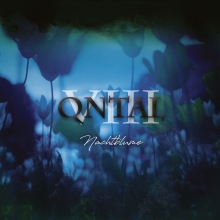MENNO VON BRUCKEN FOCK
VIII-NACHTBLUME (E)

Qntal has been around for quite a while and may celebrate their 25th anniversary this year. Founded in 1993, composer and multi-instrumentalist Michael Popp (keyboards, tar and shepherd’s pipe, among others) and singer Syrah still form the nucleus of Qntal. Ernst Horn, the other founding member, left in 1999. VIII- Nachtblume contains a very unique mix of medieval music and ambient, electronic and dance music. Most lyrics date from ancient times. Both medieval instrumentation and a considerable quantity of electronic instruments are used. The soothing voice of Syrah keeps the listener mesmerized using the Latin, English and German language. Although the emphasis was originally on medieval instruments and folk music, through the years Qntal’s music has shifted more towards electronic and pop. So while the albums of the nineties show more characteristics of pure folk music and bands like Blackmore’s Night, the current album is far more pop-oriented with more ‘modern’ characteristics and influences by artists like Dead Can Dance, while there are also influences of ambient and classical music. The title track is a melancholic ballad, sung in German with an up-tempo danceable middle-section. Popp gets some help from a drummer and a violinist. Die Finstere Nacht is an up-tempo track filled with electronic orchestrations and we also hear Popp singing in German. It could have been a track by Propaganda. As could expected Music On The Waters is sung by Syrah in English, a soothing slow track, a beautiful ballad with a slightly oriental sounding section incorporated. In Monteclair an ancient sounding language is used. Being a Dutchman, I couldn’t figure out what I was supposed to hear but is sounds really nice, a bit like a rather melancholic track by Yazoo. This track contains a different section as well, but this time classically orientated with a choral vocal by Syrah. Sung in German, Echo is definitely the most pop-like song on the album. Although Popp uses some of his medieval instruments, I think, the main focus is on the keyboards. Parliament Of Fowles has got a nice catchy shuffle as a rhythm. The subtle drumming enhances the keyboards in a well-succeeded attempt to combine dance music with medieval flutes and melodies. In Chint we hear an up-tempo beat: back to the dance hall days and disco. Still the singing is ethereal and the melodies date from medieval times. In Before The World Was Made the electronic percussion and keyboards are the main accompaniment and Popp plays one of his medieval instruments, probably a shepherd’s flute. This music could also have been performed by Propaganda as one of their more melancholic songs. Syrah sings O Fortuna in Latin and in a more up-tempo and cheerful style: a frivolous synthi-pop tune. Close to fellow-countryman Michael Cretu’s project Enigma is the music in the next track called Minnelied, evidently sung in German. Sumervar shows characteristics from both synthi-pop and electronic dance music, but the spirit of famous artists like Kraftwerk is unmistakably there as well, especially detectable in the last track A Chantar. Personally, I like their former albums better, but VIII-Nachtblume is still an astonishing album especially for those who have never heard of Qntal before. Their music is hard to compare with other bands, because of the use of ancient instruments next to modern technology, their exquisite choice of lyrics and the fact that they found a way to thrill a wide variety of music lovers ranging from fans of classical music, folk music as well as fans of gothic and rock music.